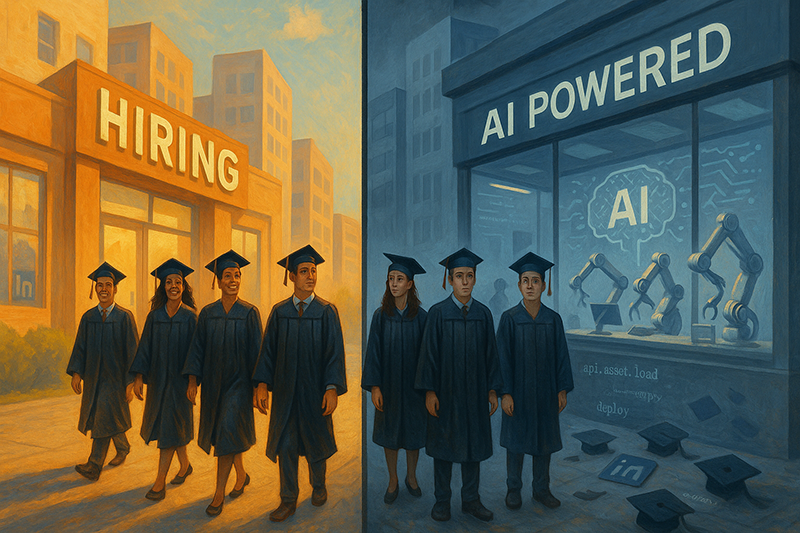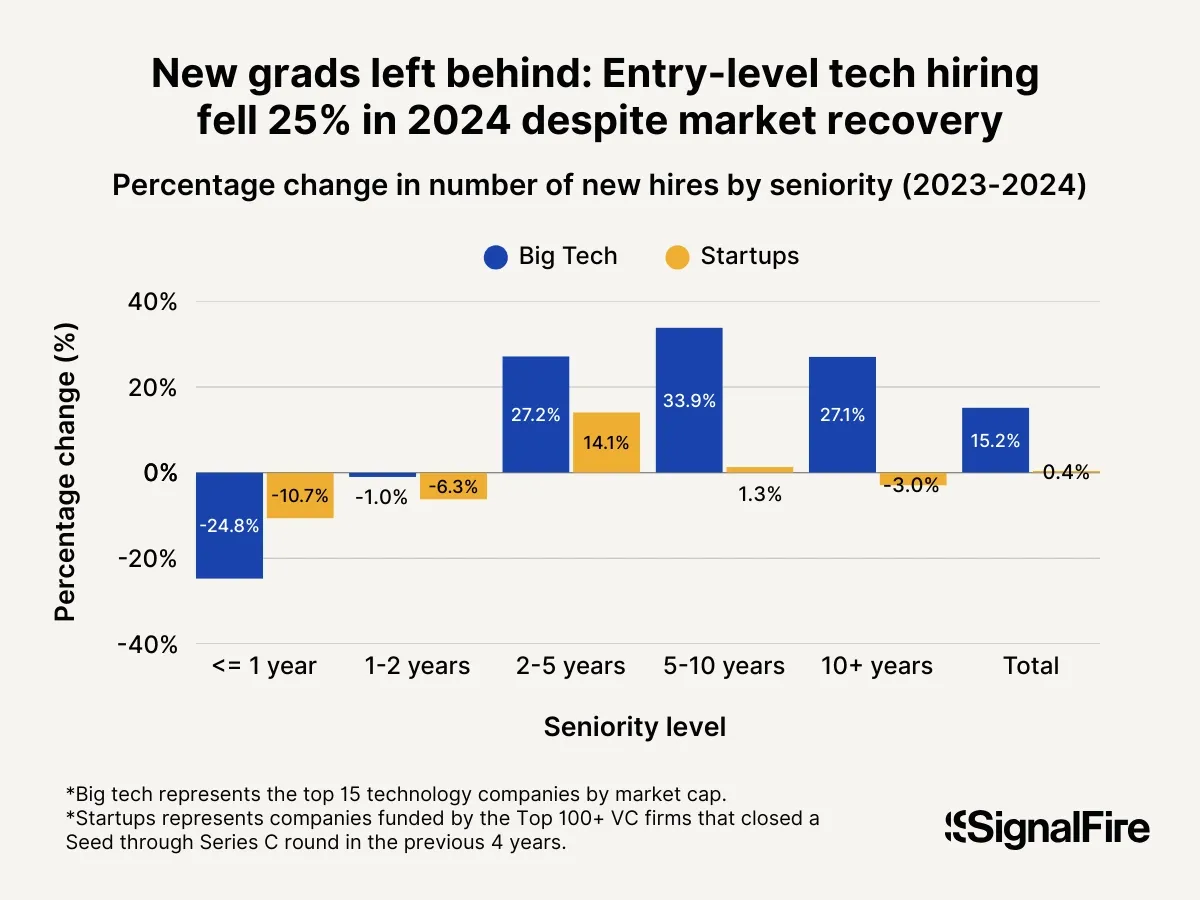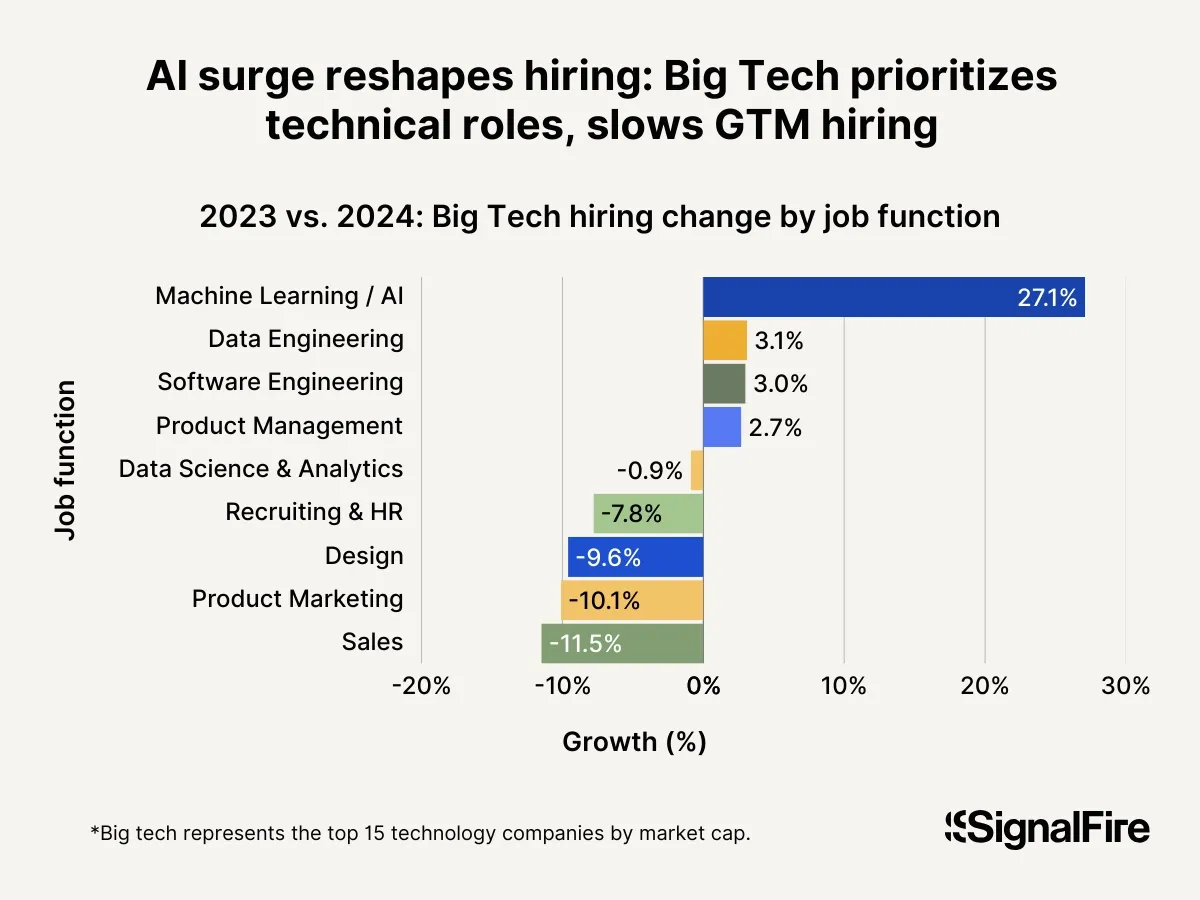The AI Hiring Crisis: How Artificial Intelligence is Reshaping Entry-Level Employment

The job market for new graduates has taken a dramatic turn, and the numbers tell a sobering story. Recent data reveals that artificial intelligence isn't just changing how we work, it's fundamentally altering who gets hired in the first place.
The Stark Reality: New Grad Hiring Plummets
A comprehensive analysis by venture firm SignalFire, which tracked hiring patterns across 650 million LinkedIn profiles and 80 million companies, has uncovered a troubling trend. In 2024, new graduates represented just 7% of all hires at tech giants like Meta, Microsoft, and Google. This marks a devastating 25% decline from 2023 levels and represents more than a 50% drop compared to pre-pandemic hiring in 2019.

The situation at startups is even more dire. These companies, traditionally seen as entry points for recent graduates, have seen junior-level hiring plummet from roughly one-third of all hires in 2019 to under 6% in 2024. The startup ecosystem, once a reliable pathway for career beginners, is rapidly closing its doors to entry-level talent.

The AI Automation Factor
According to Asher Bantock, SignalFire's head of research, the culprit behind this dramatic shift is straightforward: generative AI has automated most routine onboarding tasks. From boilerplate coding to financial spreadsheet cleanup, the work that traditionally provided training grounds for new employees is now being handled by artificial intelligence.
This automation trend isn't just affecting the quantity of entry-level positions, it's fundamentally changing the nature of what employers expect from new hires. The routine, learn-as-you-go tasks that once served as stepping stones into professional careers are disappearing, leaving new graduates to compete for increasingly specialized roles that require skills beyond basic training.
A Warning from the Top: Unprecedented Job Displacement Ahead
Perhaps most concerning is the stark warning from Dario Amodei, CEO of Anthropic, one of the leading AI companies. In recent interviews with Axios and CNN, Amodei painted a picture of unprecedented job displacement, predicting that within one to five years, AI could eliminate half of all entry-level white-collar roles.

His projections are staggering: unemployment could spike to 10-20% as AI systems become capable of handling an ever-expanding range of professional tasks. Amodei has even suggested that large language models may write essentially all of the code for major companies within a single year, fundamentally altering the landscape for software development careers.
The Vulnerability Curve: Who's at Risk?
Research from the Brookings Institution supports these dire predictions, revealing a clear vulnerability pattern in the job market. The data shows that certain entry-level positions face dramatically higher automation exposure:
- Market research analysts face over 50% task automation exposure
- Graphic designers in entry-level positions show similar vulnerability
- Sales representatives at the junior level are highly exposed to AI replacement
- Administrative and clerical workers face significant displacement risk
Conversely, senior specialist roles and positions requiring complex human interaction, creativity, or physical presence show far lower risk profiles. This creates a concerning scenario where the traditional career ladder, starting with entry-level positions and advancing through experience may no longer exist in many fields.
The New Reality for Graduates
For students finishing computer science degrees and other technical programs, the implications are clear and immediate. The traditional path of landing an entry-level position to gain experience and build skills is becoming increasingly unavailable. Instead, new graduates must demonstrate capabilities that large language models and AI systems cannot yet replicate.
This shift represents a fundamental change in how we think about career development. Rather than learning on the job, new graduates must arrive with sophisticated skills that differentiate them from AI capabilities. The question becomes: what skills will remain uniquely human in an AI-dominated workplace?
Beyond the Numbers: What This Means for Society
The hiring crisis extends far beyond individual career concerns. It represents a broader challenge to our economic and social structures. Traditional pathways to middle-class careers are being disrupted faster than new ones can be created. This raises critical questions about:
- Economic inequality: If entry-level positions disappear, how do people build careers and economic stability?
- Social mobility: Will the elimination of traditional career ladders create new barriers to advancement?
- Educational relevance: How should universities adapt their curricula to prepare students for an AI-transformed job market?
The Skills That Matter Now
While the situation appears dire, it's not entirely hopeless. The key lies in developing capabilities that complement rather than compete with AI systems. These include:
Human-Centric Skills: Emotional intelligence, complex problem-solving, creative thinking, and the ability to work with ambiguous or incomplete information remain uniquely human.
AI Collaboration: Rather than competing with AI, successful professionals will need to become expert at working alongside AI systems, leveraging their capabilities while providing human oversight and creativity.
Continuous Learning: The rapid pace of AI development means that the skills needed today may be different from those needed tomorrow. Adaptability and continuous learning become essential survival skills.
Looking Forward: Navigating the New Landscape
The research from SignalFire and warnings from industry leaders like Amodei suggest we're at an inflection point. The traditional model of entry-level employment is being fundamentally disrupted, but this disruption also creates opportunities for those who can adapt.
For current students and recent graduates, the message is clear: focus on developing skills that AI cannot easily replicate, learn to work effectively with AI systems, and prepare for a job market that looks dramatically different from the one previous generations experienced.
For employers, the challenge is finding new ways to develop talent and maintain the human elements that drive innovation and customer connection. For society as a whole, we need to grapple with the implications of this transformation and develop new models for economic participation and career development.
The AI hiring crisis isn't just about technology, it's about the future of work itself. How we respond will determine whether AI becomes a tool for broader prosperity or a driver of increased inequality. The clock is ticking, and the decisions we make today will shape the opportunities available to tomorrow's workforce.
The data and trends discussed in this article are based on recent research from SignalFire's analysis of LinkedIn hiring data, statements from Anthropic CEO Dario Amodei, and workforce studies from the Brookings Institution. As the AI landscape continues to evolve rapidly, these patterns and predictions should be monitored closely for ongoing developments.